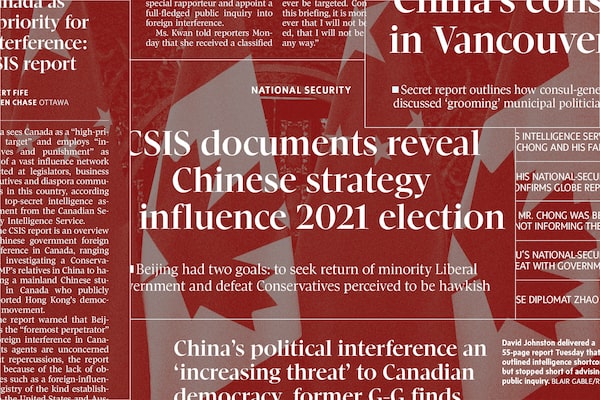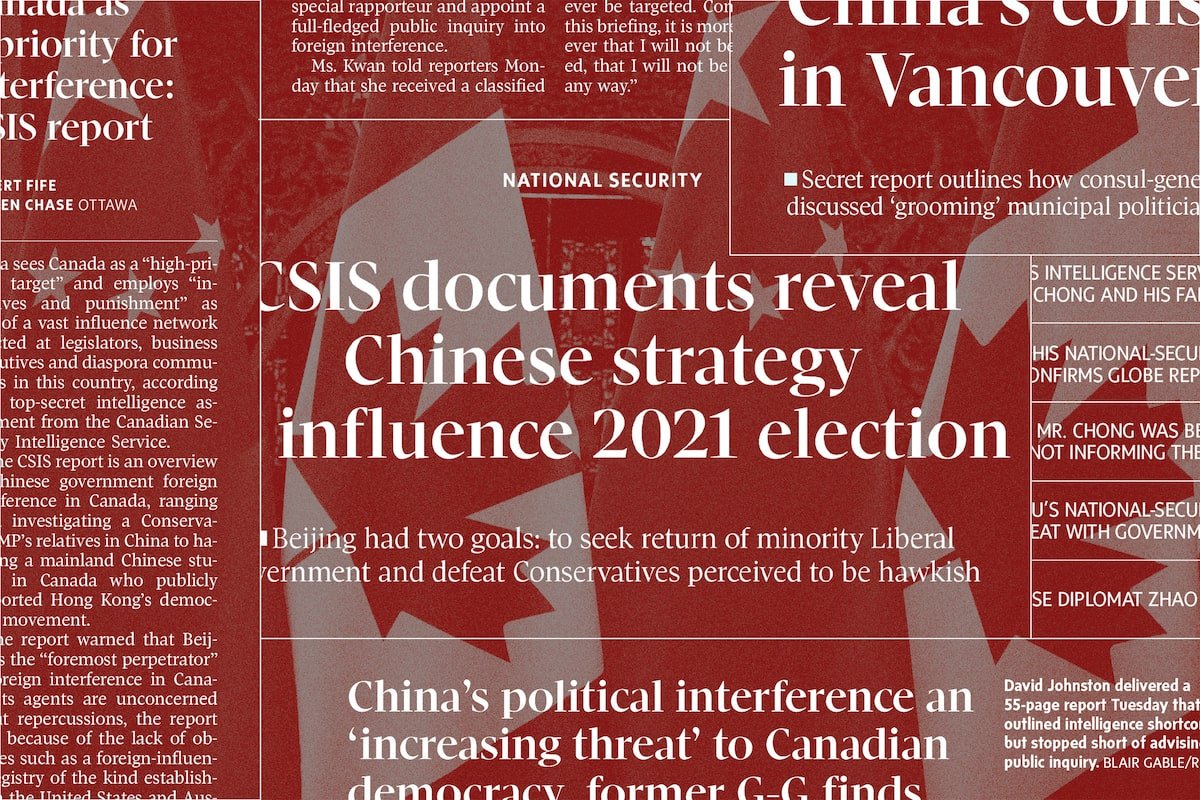Good morning. Canada’s foreign-interference inquiry starts its next round of hearings today and we stitch together what’s happened so far – more on that below, along with a pair of crucial by-elections and B.C.’s breath-holding free divers. But first:
Today’s headlines
- The FBI is investigating an apparent assassination attempt on Donald Trump at his Florida golf club
- Air Canada and its pilot union reach a tentative deal, including a 42-per-cent raise over four years
- Premier Dave Eby announced that B.C. will introduce involuntary care for people will addictions
- At the 2024 Emmy Awards, Dan and Eugene Levy come up mostly roses on Hacks-dominated evening

Illustration The Globe and Mail. Background photo Fred Dufour/The Canadian Press/AP/The Globe and Mail
Politics
Previously on: the foreign-interference inquiry
Today marks the return of the House of Commons – and with it, a new phase in Justice Marie-Josée Hogue’s Foreign Interference Commission. But three full months have passed since Parliament headed off on recess, and it hasn’t exactly been a slow-news summer. You’d be forgiven for losing track of the inquiry’s probe into threats to our democracy.
My colleagues at The Globe have you covered. Our Ottawa Bureau Chief, Robert Fife, and senior parliamentary reporter, Steven Chase, detail what to expect from the commission as hearings get under way this week. And Evan Annett, an editor on The Globe’s visuals team, has put together a helpful refresher on what’s happened with the inquiry so far. It’s well worth reading their reporting in full, but here’s a look at where we left the foreign-interference inquiry.
Why again are we doing this?
Canada’s ties with China, Russia, India and Iran have been more frayed than usual in recent years, so those countries (and others) have motivation to meddle in our domestic politics. The Canadian Security and Intelligence Service found worrying examples of misinformation and voter suppression in the 2019 and 2021 federal elections, mostly aimed at opposition MPs critical of Beijing, such as Conservatives Michael Chong, Erin O’Toole and Kenny Chiu and New Democrat Jenny Kwan. In September, 2023, Quebec appeal court justice Hogue agreed to head a public inquiry into foreign interference.
What happened in Phase 1 of the inquiry?
This phase, with public hearings that ran in March and April, was more of a fact-finding mission to see whether foreign actors had skewed the election outcomes, and also who knew what about foreign interference, and when.
A CSIS document from February, 2023, informed the Prime Minister’s Office that China had “clandestinely and deceptively interfered” in both elections, and cited dozens of previous briefings to the PMO on that interference. But PMO chief of staff Katie Telford and her aides said they never heard CSIS’s gravest concerns when they met with the spy agency. Prime Minister Justin Trudeau said no one relayed the concerns to him, and since he rarely reads written intelligence briefings, a meeting or call was the “only way to guarantee, to make sure, that I receive the necessary information.”
Justin Trudeau testifies at the inquiry in April.Sean Kilpatrick/The Canadian Press
The PMO was dismissive of Conservatives’ assertions that China cost them seats, as was Trudeau when he testified. Based on what she heard, Hogue said in her May 3 report that interference was a “stain” on the electoral process. It’s possible, she concluded, that results in a small number of ridings were affected, but the national outcomes in 2019 and 2021 would have been the same regardless.
What about that other, bombshell report?
In a separate investigation, MPs and senators at the national-security watchdog NSICOP looked into whether Canadian parliamentarians have colluded with hostile states such as China and India. According to its report, dropped in June, that’s just what’s happening: Some politicians are “witting or semi-witting” participants in foreign efforts to disrupt Canadian democracy. That could mean accepting money or perks from foreign governments, working together to mobilize community support in their favour, or handing over privileged information, knowing it would be used to put pressure on other politicians to change their votes.
The public version of NSICOP’s report did not identify those politicians, and the government has ruled out releasing their names. Federal parties voted to send the findings to Hogue’s team for review.
What’s happened since?
Through Bill C-70, which received royal assent in June, it is now illegal to help foreign agents enter Canada disguised as tourists, or to meddle in candidate nominations on behalf of another country. But crucial tools for enforcing these laws, including a foreign-agents registry and a transparency commissioner to oversee it, have yet to be set up. And passing bills was easier before Jagmeet Singh ended his party’s deal with the Liberals, which also makes a federal election – previously expected in the fall of 2025 – much likelier to happen sooner. It’s unclear who will be in power to act on Hogue’s final recommendations, due Dec. 31.
And now what?
Hogue’s first report called on Ottawa to restore trust in democracy through “real concrete steps to detect, deter and counter” foreign interference. In Phase 2 of the inquiry, she’ll ask witnesses, including Trudeau and members of his inner circle, what those steps could look like. You can read more from The Globe about who’s on deck to testify this week, and what we might hear about how to safeguard our democracy.
The Shot
Finding adventure (and dinner) in the deep
Those are big ol’ crabs.Nicole Holman/The Globe and Mail
B.C.’s growing ranks of free divers can plunge nearly 100 metres below the water’s surface – holding their breath for as long as six minutes – to get up close and personal with octopi and to spear ling cod for supper. Learn more about the folks venturing into this “cold, dark and green part of the world” here.
The Week
What we’re following
Today: Voters head to the polls in two tighter-than-expected by-elections: Winnipeg’s Elmwood-Transcona, where the NDP hope to fend off the Tories, and Montreal’s LaSalle-Émard-Verdun, where Liberals face a must-win race).
Tomorrow: Statistics Canada releases its inflation data for August.
Tomorrow: The Polaris Music Prize winner is crowned. (Will it be the rock band Beaches? You can check in on their view from the road.)
Wednesday: The U.S. Federal Reserve is widely expected to deliver a rate cut for the first time in four years.
Saturday: Still more election news, as the writs are issued for B.C.’s contest on Oct. 19, which the BC United Party chose to sit out.
